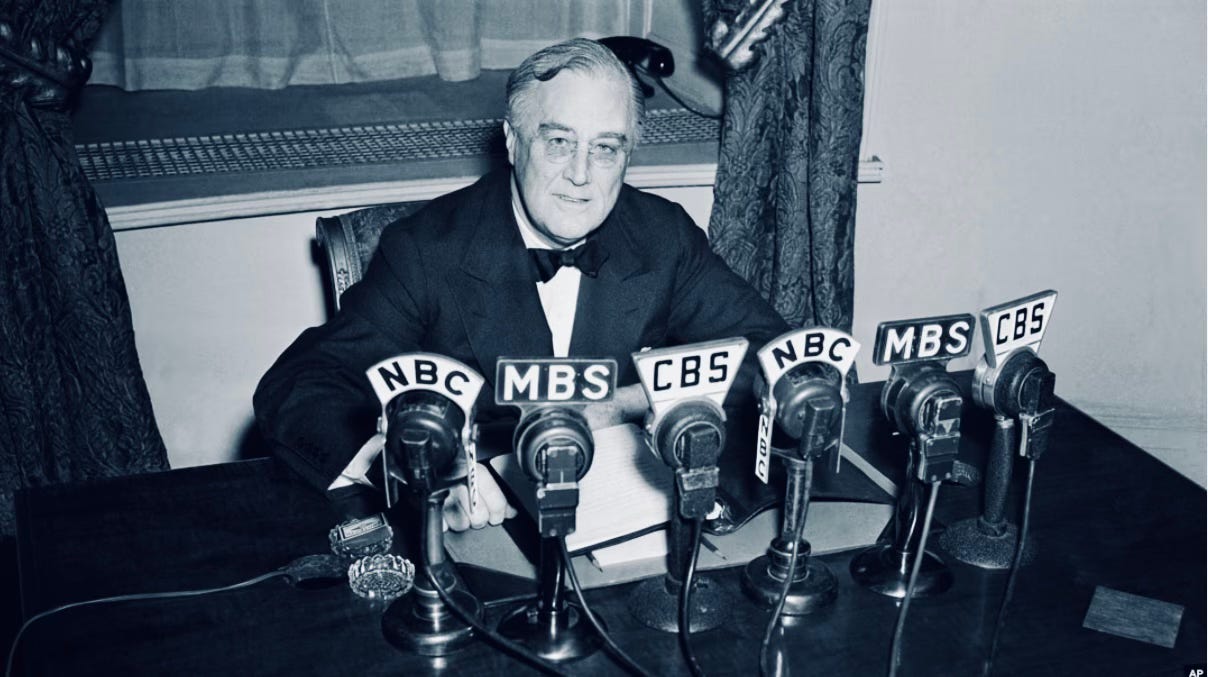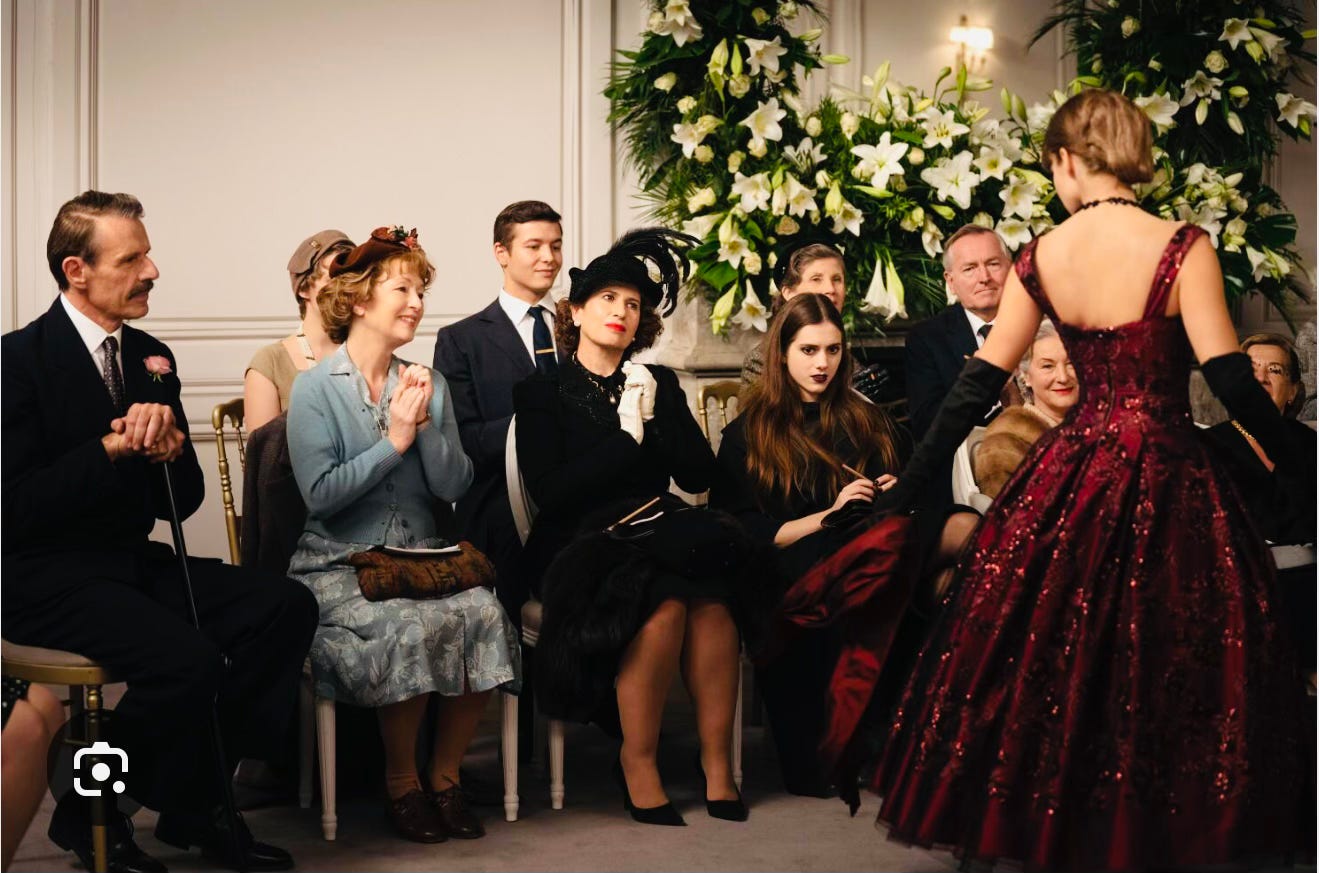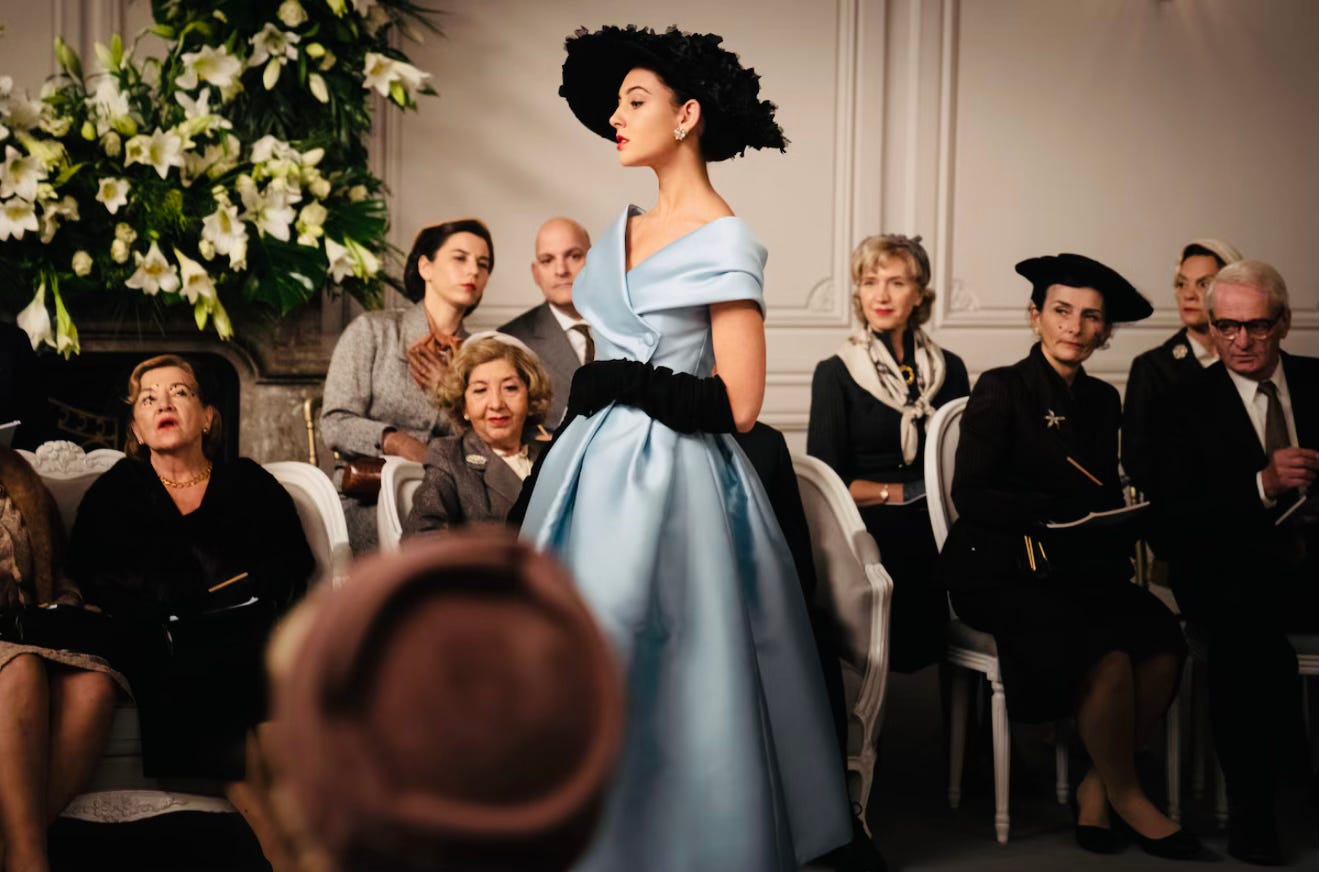The Voice of America silenced; Republicans dig deep on evil-doing; et "Une Robe pour Mrs. Harris."
GOP voters can't stop supporting cruelty against their fellow Americans and others around the world. They don't mind, but we do.
It’s day 63 since the U.S. Inauguration and here are just some of the devastating developments brought to you this week by Republicans:

The Voice of America is officially silenced.
Founded in 1942 to counter Nazi propaganda, Voice of America was an international broadcasting state media network funded by the federal government of the United States to tell America’s story to the world, and preserve freedom of speech. It operated in 50 languages, since launching in English and German, and was mandated by law to provide the world with free, fair, and unbiased reporting.
OH WELL.
Donald Trump just squashed a fundamental, and iconic, pillar of free speech to the sheer delight of those who wish ill on the world. For the first time since 1942, VOA has been taken off the air, after Trump put virtually all of its 1,300 staff on leave. The administration also shut down VOA’s sister outlets Radio Free Europe/Radio Liberty and Radio Free Asia.
According to The Washington Post, six Voice of America journalists — including the outlet’s former White House bureau chief — sued members of the Trump administration Friday, accusing officials of unlawfully shuttering a federally funded media outlet that has delivered news coverage to millions across the globe since its founding during World War II.
Also per (Washington) Post Opinions on Instagram:
Voice of America went on the air eight weeks after Pear Harbor. “We bring you voices from America,” journalist William Harlan Hale said in German on February 1, 1942, in VOA’s first broadcast. “Today, and daily from now on, we shall speak to you about America and the war. The news may be good for us. The news may be bad. But we shall tell you the truth.”
In the 83 years since then, VOA has been the voice of freedom across the globe, a constant force countering totalitarianism during World War II, the Cold War, and the decades since.
Adolf Hitler couldn’t silence it. Joseph Stalin and his successors, right up through Vladimir Putin, couldn’t silence it. Mao Zedong and his successors, through Xi Jinping, couldn’t silence it. Ruhollah Khomeini and the ayatollahs couldn’t silence it.
So while the Trump administration sells its followers on the idea that it is cutting government “waste and fraud,” and they continue to lap up these lies, The Voice of America is decimated in a moment when Russia, Iran, and China are spending billions of dollars on anti-American propaganda campaigns. Voice of America was a soft power mouthpiece for American values, in the same way that USAID was committed to strengthening democracy and human rights around the world. Now both are gone in a moment when we need them most.
It’s been a busy week for Republicans dismantling America’s reputation and rewriting history:
Pete Hegseth, Satan’s Secretary of Defense, removed Colin Powell’s name from a list of notable Americans who are buried at Arlington National Cemetery. Hegseth also removed the names of every person of color and every woman on the same list. Only white men were left in place.
Related and breaking this past Thursday, the United Kingdom, Germany, Finland, and Canada issued warnings to their citizens against travel to the U.S. Why? Because so many intolerant live here among us. See Pete Hegseth above, the entire GOP regime, and the 77 million people who voted in support.
And then there is Columbia University, that shiny Ivy League institution with an endowment of $14.8 billion as of October 16, 2024 (up from $13.6 billion in 2023).
The Trump administration canceled $400 million in federal grants and contracts to Columbia University two weeks ago over what it described as the school’s failure to police antisemitism on campus. Said cancellation was announced in a joint statement from the Department of Justice, Department of Health and Human Services, and the U.S. General Services Administration.
So how did Columbia respond to outside political pressure? Why instead of going behind closed doors to work out a response grounded in a shared set of community values, the powers that be at Columbia instead decided to very publicly pander to Dear Leader and team, by agreeing to implement a host of policy changes this past Friday, that include an overhaul of its rules for protests and conduct, and a promise to immediately review its Middle Eastern Studies department.
Historians described the Trump administration’s order as an unprecedented intrusion on university rights long treated by the Supreme Court as an extension of the First Amendment. And on Friday, freedom of speech advocates immediately decried Columbia’s decision to acquiesce. “A sad day for Columbia and for our democracy,” Jameel Jaffe, the director of Knight First Amendment Institute at Columbia University said in a social media post.
Columbia appears to be groveling to Satan & Co to re-instate their $400 million in federal funding. As opposed to taking the high road when they can financially well afford to — what with that $14.8 billion at their disposal, and last year’s nine figure windfall alone, which is three times the amount of the funds just stripped from them.
High fashion for the head and the heart: Mrs. Harris Goes to Paris
But let’s leave the evil doing behind for just a minute, and harken back to another moment when human decency, grace, and kindness prevailed- in this particular instance in post-World War II London and Paris. And while we’re at it, let’s explore the importance of the life of the mind — and the cultivation of the head and the heart. A concept so obviously lost right now on 77 million U.S. Republican voters.

So dieu merci for Mrs. Harris Goes to Paris (en français, Une robe pour Mrs. Harris), a historical comedy drama adapted from the 1958 novel “Mrs. ‘Arris Goes to Paris” by Paul Gallico. It’s a modern day Disney-like movie designed for internationalists who adore fashion, Paris, French culture, the Brits, history, the art of couture, and the house of Christian Dior.
And we’ll now add French existentialism to the list above, since this lighthearted adventure also explores a premise so central to Jean-Paul Sartre’s work Being and Nothingness: “Être-en-soi et être-pour-soi.”
Être-en-soi translates into being-in-itself: which refers to the state of being that is self-contained and objective. This is the material world, and objects, and an understanding that things exist whether or not there is human awareness of them. Whereas Être-pour-soi translates into being-for-oneself: a state of thinking and being that allows for consciousness, subjectivity, and self-reflection. It is an awareness of the fact that we exist within ourselves, and also within the larger world around us.
Jean-Paul Sartre believed that humans are born without a predetermined nature or purpose, and as such are empowered to create their own essence, and their own destiny, through the quality of their personal choices and individual actions.
Sure, it’s heavy. But in this U.S. political season — in our own mind-bending existential moment in history — it is a critical way of thinking which flies in the face of the American idiocy we witness on the political voting right, as they fail spectacularly to properly grasp, among so many other things, the true essence and actual attributes of American exceptionalism.
Instead, 77 million Republican voters appear to have gone all in on “L’État, c’est moi.” And they don’t even know it. They’re repeating history because they don’t know what they don’t know. Because once upon a time they likely instead studied “more practical” subjects like Business Accounting or Computer Coding (and clearly never read Sartre)— rendering them now completely ill-equipped to put current political developments into accurate context. And their ignorance now sits on full display for the rest of us in the U.S. and around the world.
“L’État, c’est moi” translates into “I am the state, the state is me”, an apocryphal phrase attributed to Louis XIV, King of France and Navarre- which symbolizes absolute monarchy and absolutism, the state it is I, and I myself am the nation.
Ring familiar?
But now let’s continue into the light.
And in a nutshell, below please find the plot for Mrs. Harris Goes to Paris (which I watched six times in French in 2022, and approximately 72,000 times since then in English):
In London 1957, we meet the widowed Mrs. Ada Harris who works as a cleaning lady for an upperclass British battle-ax who appreciates not Ada’s hard work nor commitment to her job. In her free time, Ada hangs out with her best friends Vi (a fellow cleaning lady) and Archie, a local bookie.
While Ada’s boss complains that their family finances are so tight that she is unable to pay Ada for the foreseeable future, she still manages to buy herself a divine piece from Christian Dior’s most recent haute couture collection. In caring for her boss’ very special dress, Ada falls madly in love with it and decides that she too must own a piece of Christian Dior couture art. Because as someone who dares to dream, she intrinsically understands that a Dior piece could (and soon does) transform her entire existence. So after unexpectedly receiving a war widow’s lump sum pension, and in scraping up funds in other unexpected directions, Ada travels to Paris (for the first time - so exciting!) in search of both the House of Dior, and a dress.
Upon arrival, she accidentally attends an exclusive showing of Dior’s 10th Anniversary Couture Collection (this is fashion fantasy after all) and is befriended by André, Dior’s accountant, and Natasha, a Dior house model. Trouble ensues when the terribly haughty House Directrice, Claudine, resents Ada’s overly familiar British ways — not to mention her intrusion into such rarified circles — and she initially rejects Ada as a client.
But fortunately for Ada, Dior has fallen on hard times, so André convinces the powers that be to agree to let Ada buy a dress and pay for it in cash. Ada falls in love with a red dress called the Temptation, but one of the richest clients in the room — Madame Avallon, wife of “The King of Garbage” — Paris’ reigning waste management company — instead claims the dress, and demands exclusivity, which forbids Christian Dior from making the same dress for anyone else, let alone Ada. Ada makes do with a different design in green.
Ada must remain in Paris for two weeks worth of daily fittings at Dior, and since she has blown her wad on her dress, André invites her to stay in his sister’s room at their flat in Paris’ modest outskirts. When not in fittings, Ada plays match-maker between André and Natasha, who bond over a shared love of Jean-Paul Sartre and French existentialism. Ada meanwhile catches the eye of Paris’ most eligible bachelor, the terribly grand Marquis de Chassagne, who shows her kindness and invites her to spend time with him.
When Claudine fires Dior staffers out of financial desperation, Ada organizes a workers strike which forces Christian Dior himself to listen to André’s ideas to modernize the business, which involves making Dior designs more accessible to less affluent buyers like Ada. Dior listens to André, and the venerable House of Dior is saved.
Ada returns to London with her dress, with big plans to make her debut in it at a neighborhood dance. But before the big event, she last minute lends her Dior Couture gown to her young friend Pamela, an up and coming actress, who wears it to a splashy London party, and in standing too close to a space heater, very publicly accidentally sets the dress on fire.
When Ada’s friends from Dior read about this development in Paris’ social pages, they circle wagons and send her (as a gift) the very red dress that she had originally requested. The King of Garbage’s wife can no longer pay for it since her husband has just been served serious comeuppance, financial and otherwise. Ada wears this new dress to the neighborhood dance, and is the belle of the ball. Seeing her resplendent in her Dior dress and also witnessing her magnificent inner essence emanating outward, Archie finds himself enchanted and tells Ada that she is a beautiful person. (So obvious to the rest of us, and from the start!)
Mrs. Harris Goes to Paris brilliantly captures the magic of Paris by making the invisible visible to both the head and the heart and reminds us that in being open to making friends in Paris — in places you least expect and within the full spectrum of society — your life becomes transformed. (We’re not talking about being an American in Paris from Cleveland, who meets someone from Chicago or vice versa. This is instead about creating connection with the actual French, achieved through an appreciation of their culture and a love of their history.)
Mrs. Harris Goes to Paris breaks down borders, bridges alliances, and celebrates French perspective through fashion as foreign affairs, elegance as advocacy, grace as geopolitics, inclusion as always impeccable, and refinement as resistance. I highly recommend!
Coming up next: secrets that stylish people never share. Subscribe here so you don’t miss!
What I’m reading this week:
Joyce Vance Civil Discourse. Critical perspective from a former U.S. Federal Prosecutor.
Michael Moore Always spot on (scary) important food for thought.
Monica Ainley DLV Mon Review delivers entertaining insight on fashion, style and culture- this past week Monica shared thoughts on the above while wearing her Canadian hat. Timely.


